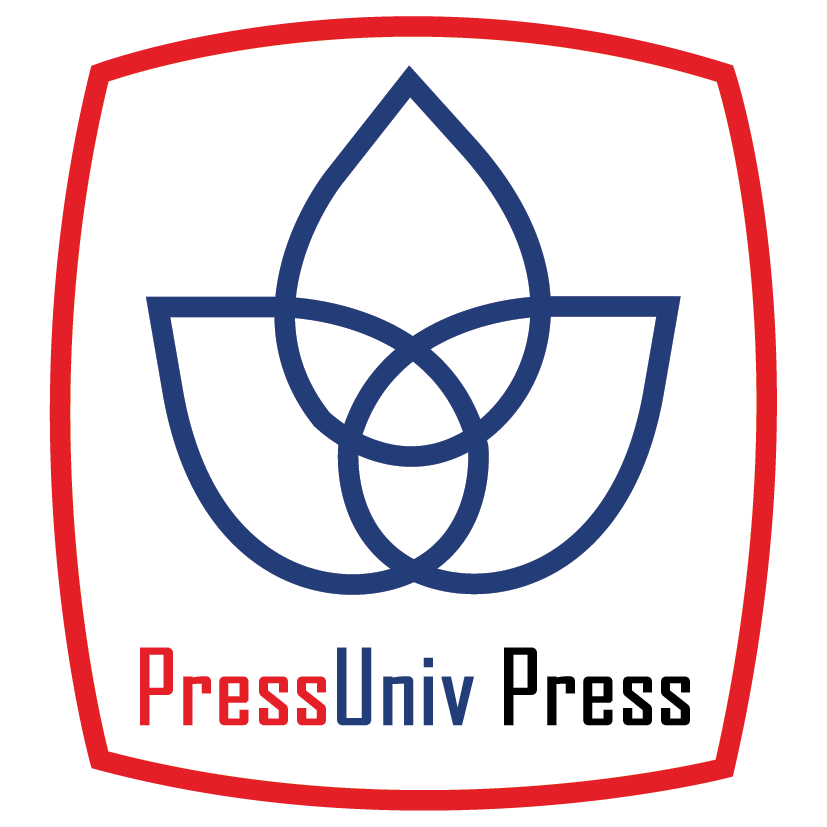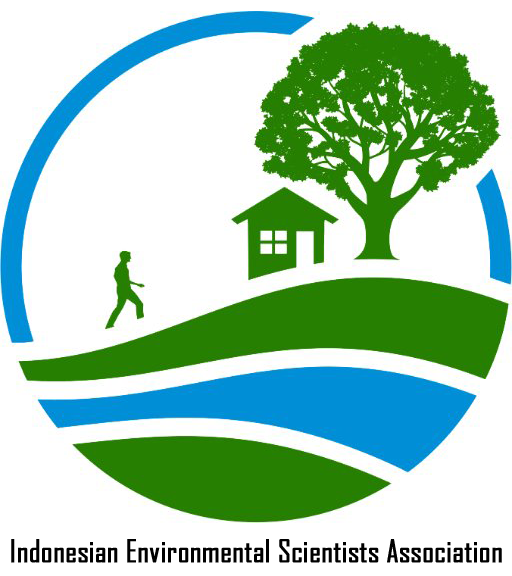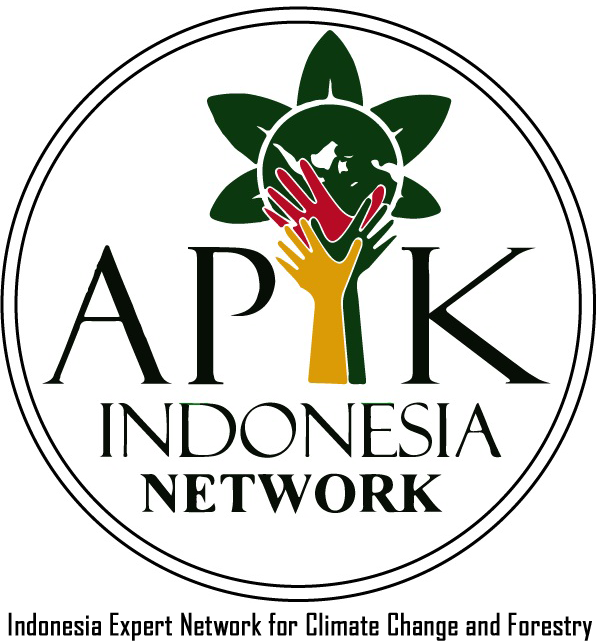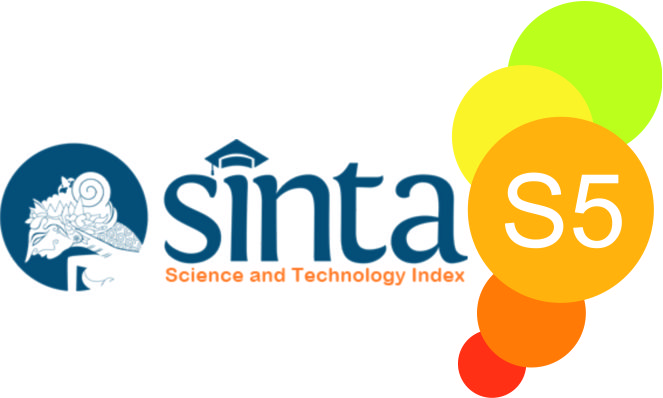The Study of Eco Enzymes Application For Decoloring Textile Industry Wastewater Following by pH Value Analysis
Abstract
Keywords
Full Text:
PDFReferences
Kementerian Perindustrian RI. (2019, May 12). Siaran Pers. Lampaui 18 Persen, Industri Tekstil dan Pakaian Tumbuh Paling Tinggi.
BPS, & Ditjen IKMA-Kemenperin. (2016). Banyaknya Unit Usaha Batik (KBLI 13134).
Zain, H. M. (2019, December 18). Polemik Limbah Batik di Kota Pekalongan – Radar Pekalongan Online. Radar Pekalongan. Retrieved January 24, 2022, from https://radarpekalongan.co.id/90786/polemik-limbah-batik-di-kota-pekalongan/
Raditia. (2020, September 9). Sungai Elo Tercemar Limbah Pabrik Tekstil Warga Mengeluh. Gatra. gatra.com
Ismail, M. (2021, September 8). DLHK Jateng Sebut Limbah Industri Tekstil Dinilai Jadi Sumber Pencemaran Bengawan Solo. Timlo.net. Retrieved January 24, 2022, from https://timlo.net/baca/155263/dlhk-jateng-sebut-limbah-industri-tekstil-dinilai-jadi-sumber-pencemaran-bengawan-solo/
Hemaltha, M., & Visantini, P. (2016). Potential use of eco-enzyme for the treatment of metal based effluent, 716. doi:10.1088/1757-899X/716/1/012016
Rasit, N., Fern, L. H., & Ghani, W. A. W. A. K. (2019). Production and Characterization of Eco Enzyme Produces From Tomato and Orange Wasre and Its Influence on The Aquaculture Sludge, 10(3), 967-980. ISSN Print: 0976-6308 and ISSN Online: 0976-6316
Mahmood, B. F., Aziz, G. M., & Buniya, H. K. (2018). Purification and Characterization of Laccase Extracted from Cladophora sp. and Its Role in Decolonization of Dyes, 10(5), 193-202. ISSN: 0975 -8542
Arun, C., & Sivashanmugam, P. (2015). Investigation of biocatalytic potential of garbage enzyme and its influence on stabilization of industrial waste activated sludge, 94, 471-478. doi: 10.1016/j.psep.2014.10.008
Arun, C., & Sivashanmugam, P. (2015). Solubilization of waste activated sludge using a garbage enzyme produced from different pre-consumer organic waste. 5, 51421-51427. doi: 10.1039/c5ra07959d
Arun, C., & Sivashanmugam, P. (2017). Study on optimization of process parameters for enhancing the multi-hydrolytic enzyme activity in garbage enzyme produced from pre-consumer organic waste. 226, 200-210. doi: 10.1016/j.biortech.2016.12.029
Badan Standarisasi Nasional RI. (2011). SNI 6989.80-2011 Air dan air limbah - Bagian 80: Cara uji warna secara spektrofotometr. AKSES-SNI.
Badan Standardisasi Nasional. (2019). SNI 06-6989.11-2004 Air dan air limbah - Bagian 11: Cara uji derajat keasaman (pH) dengan menggunakan alat pH meter. AKSES - SNI.
Lagha-Benamrouche, S., & Madani, K. (2013). Phenolic contents and antioxidant activity of orange varieties(Citrus sinensis L.and Citrus aurantium L.) cultivated in Algeria:Peels and leaves. Industrial Crops and Products, 50, 723-730. http://localhost/var/www/apps/conversion/tmp/scratch_5/dx.doi.org/10.1016/j.indcrop.2013.07.048.
Franke, A. A., Cooney, R. V., Henning, S. M., & Custer, L. J. (2008). Bioavailability and antioxidant effects of orange juice components in humans. J Agric Food Chem, 53(13), 5170-5178. doi https://dx.doi.org/10.1021%2Fjf050054y
Aruna, Y. (2013). Studi Kadar Trigliserida Dan Gambaran Histopatologi Hepar Hewan Model Tikus (Rattus Norvegicus) Hiperkolesterolemia Dengan Terapi Ekstrak Air Benalu Mangga (Dendrophthoe Petandra). Thesis, Universitas Brawijaya.
Khairunnisa. (2018). Perbandingan Efektifitas Jus Buah Tomat (Lycopersicum esculentum M.) Dengan Jus Buah Jambu Biji Merah (Psidium guajava L.) Terhadap Penurunan Kadar Trigliserida Tikus Putih (Rattus norvegicus L.) Jantan Galur Wistar Yang Diinduksi Diet Tinggi Lemak http://repository.umsu.ac.id
Galintin, O., Rasit, N., & Hamzah, S. (2021). Production and Characterization of Eco Enzyme Produced from Fruit and Vegetable Wastes and its Influence on the Aquaculture Sludge, 11(3). doi.org/10.33263/BRIAC113.1020510214
Gu, S., Xu, D., Zhou, F., Chen, C., Liu, C., Tian, M., & Jiang, A. (2021). The Garbage Enzyme with Chinese Honeylocust Fruits Showed Better Properties and Application than When Using the Garbage Enzyme Alone. 10. doi: 10.3390/foods10112656
Vama, L., & Cherekar, M. N. (2020). Production, Extraction and Uses of Eco Enzyme Using Citrus Fruit Waste: Wealth From Waste, 22(2), 346-351. ISSN-0972-3005
Guswandhi, Panjaitan, S.P.J., Setiadi, T., & Suhardi, S.H. (2007). Decolorization of Textile Wastewater Using Marasmius sp. In Modified Packed Bed Bioreactor. ISBN 978-979-16978-0-4
Jannah, F., Rezagama, A., & Arianto, F. (2017). Pengolahan Zat Warna Turunan Azo dengan Metode Feton (Fe2++H2O2) dan Ozonisasi (O3). 6(3). http://ejournal-s1.undip.ac.id/index.php/tlingkungan
Minarsih, T. (2009). Analisa Pengaruh Adanya Instalasi Pengolahan Air Limbah terhadap Kadar Krom pada Limbah Batik Pabrik di Kabupaten Pekalongan, 6(3). ejurnal.setiabudi.ac.id
Priadie, B. (2017). Potensi IPAL Skala Individu Untuk Pengolahan Limbah Cair Industri di Pekalongan. 28(1).
Qari, H. A. (2014). Decolonization of Dyes from WasteWater by Polyphenol Oxidase Enzyme Extracted from the Fungus Aspergillus sp. 8(24), 23-28.
Nurlaili, T., Kurniasari, L., & Ratnani, R. D. (2017). Pemanfaatan Limbah Cangkang Telur Ayam Sebagai Adsorben Zat Warna methyl Orange Dalam Larutan, 2(2), 11-14. ISSN 2527-6140, e-ISSN 2541-5890
Rajee, O., & Patterson, J. (2011). Decolorization of Azo Dye (Orange MR) by an Autochthonous Bacterium, Micrococcus sp. DBS 2. Indian Journal Microbiology, 51(2), 159-163.
Shah, M.P., Kavita, A.P., Sunu, S.N., & Darji, A.M. (2013). Microbial Decolorization of Methyl Orange Dye by Pseudomonas spp. ETL-M. International Journal of Environmental Bioremediation & Biodegradation, 1(2), 54-59.
Safely, V. A. (2019). Dekolorisasi Zat Warna Congo Red dan Limbah Zat Warna Tekstil Menggunakan Pseudomonas stutzeri. Skripsi. Palembang: Universitas Sriwijaya
Harisha, S., Keshavayya, J., Swarmy, B.E.K., and Viswanath, CC., (2017). Synthesis, characterization and Electrochemical Studies of Azo Dyes Derived From Barbituric Acid. Dyes and Pigments. 136, 742-753.
Pinheiro, H.M., Touraud, E., & Thomas, O. (2004). Aromatic amines from azo dye reduction: status review with emphasis on direct UV spectrophotometric detection in textile industry wastewaters. 61, 161-139. doi:10.1016/j.dyepig.2003.10.009
Kementerian Lingkungan Hidup dan Kehutanan RI. (2019). Baku Mutu Air Limbah Bagi Usaha dan/atau Kegiatan Industri Tekstil. jdih.menlhk.com.
Willmott NJ. (1997). The use of bacteria–polymer composites for the removal of colour from reactive dye effluents.
DOI: http://dx.doi.org/10.33021/jenv.v8i1.3629
Copyright (c) 2023 Annisa Rahma Anindita, Temmy Wikaningrum

This work is licensed under a Creative Commons Attribution-ShareAlike 4.0 International License.
Journal of Environmental Engineering and Waste Management Published by PresUniv Press, in collaboration with IESA and APIK Indonesia Network




